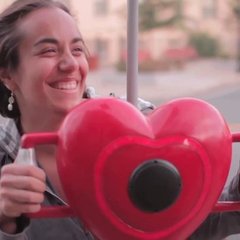
Learn
Change Only Happens When We Come Together

Growing up in a low-income community, it's easy to see first-hand what the effects of prejudice really look like. We have neighborhoods and schools that are still segregated, gang violence, and we live in food deserts. It feels like no one cares about our suffering and that people who have more are fine with our communities being this way. And when you turn on the news, you only hear that we are lazy, violent, and uneducated. They say we're a menace to society. This week, spending time at the Museum of Tolerance on Los Angeles' Westside and at 3 Worlds Cafe in South Los Angeles made us reflect on how the kind of hatred that created the Holocaust affects our community today.
We walked into the Museum of Tolerance knowing about the Holocaust, but we learned much more about how the Nazis portrayed the Jews in a negative way in newspapers, in movies, on posters, and on the radio. They would compare Jews to rats and stereotyped them as greedy, dirty, and the cause of all of Germany’s problems. Hitler then started a movement to terrorize the Jews, trashing their stores, breaking their windows, and beating them up. They then started rounding them up and putting them on trains to send them to concentration camps where they were starved, worked to death, and killed.
The scariest part of the day was going through the museum's fake gas chambers. It was scary to put ourselves in the Jews' shoes and not know whether you were going to survivor or not. We also didn’t expect to meet Gita Nagel, an Auschwitz survivor. She was visiting the museum and rolled up her sleeve to show us the tattoo of her prison camp number. We each wanted to just hug her and tell her that we are sorry for what happened to her as a child.

In our communities we aren't being starved or worked to death, and we can't compare our experience to the Holocaust. But it did make us think about the way poor black and Latino people are portrayed in the media. For example, just as the Nazis claimed that Jews were taking all the jobs, immigrant Mexicans are portrayed in the media as taking jobs from hard-working Americans. During our visit to 3 Worlds Cafe, founder Aqeela Sherrills, who helped create the 1992 peace treaty between the Bloods and Crips gangs, also challenged us to think about how the media will report differently about three kids being killed instead three gang members, even if those gang members are just teenagers.
Sherrills told us about growing up in the projects in Watts and how back in the late 1980s, there were over 1,100 deaths per year in Los Angeles. South Los Angeles had so much gang violence, it was like a war zone. Now, thanks to community activists and peace efforts, there are 300-400 murders every year.

How did Sherrills get out of the gang? He ended up attending Cal State Northridge, where he fell in love with a girl, but he had a lot of insecurity and self-esteem issues. He thought he was ugly and because he'd grown up poor, he didn't think he was as good as other students. It wasn't until he was able to be honest and start dealing with being sexually abused as a child that he started to heal. His own healing made him reflect on his community and how kids there were suffering.
One of his professors gave him two books, The Autobiography of Malcolm X and James Baldwin's The Evidence of Things Not Seen. He also educated himself about the Black Power Movement. Sherrill’s brother got a copy of the peace accord between Israel and Palestine that was drafted by Nobel Peace Prize winner and former South Los Angeles resident Ralph Bunche. They changed the names of the countries to the names of the housing projects and got the gang leaders to sign it.
Being at the Museum of Tolerance, meeting Gita Nagel, and meeting Aqeela Sherrills made us feel hopeful. It made us feel that change is possible in our communities if we all, no matter what our race or ethnicity may be, come together.
Want to mentor a student from a low income community? Click here to say you'll do it.
Desiray Figueroa and Airren Kirk are two members of the Pathfinder Fellowship, a joint effort of GOOD/Corps and The California Endowment. They're working as interns with GOOD's community team.
Cafe wall image courtesy of 3 Worlds Cafe

David Goldstein commented about 4 hours ago
Nguyen Xuan commented about 6 hours ago
baoda365 commented about 7 hours ago